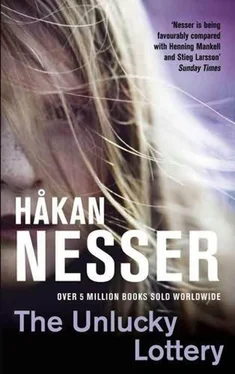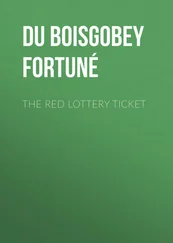Palinski lost control of his jaw and his cockiness simultaneously.
‘What?’
‘Murdered,’ said Jung. ‘Well?’
Palinski stared at him, his mouth half open, and began trembling again.
‘What… what the devil are you saying?’
‘I’m saying that somebody murdered Waldemar Leverkuhn in his home last night. You are one of the last people to see him alive, and I want to hear what you have to say for yourself.’
It looked as if Palinski was about to faint. Oh my God, Jung thought: I’m probably coming down too heavily on him.
‘You and he were out together last night,’ he said, trying to calm things down. ‘Is that right?’
‘Yes… yes, we were.’
‘At Freddy’s in Weiskerstraat?’
‘Yes.’
‘Together with two other gents?’
‘Yes.’
Palinski closed his mouth and clung on to the table top.
‘Are you all right?’ Jung asked tentatively.
‘Ill,’ said Palinski. ‘I’m ill. Are you saying he’s dead?’
‘As dead as a doornail,’ said Jung. ‘Somebody stabbed him at least twenty times.’
‘Stabbed him?’ Palinski squeaked. ‘I don’t understand.’
‘Neither do we,’ said Jung. ‘Maybe you could make us a cup of tea or coffee, so that we can talk it through in peace and quiet?’
‘Yes… Of course,’ said Palinski. ‘Fucking hell! Who could have done a thing like that?’
‘We don’t know,’ said Jung.
Palinski stood up with considerable difficulty.
‘The way of all flesh,’ he said out of the blue. ‘I think I need a few drops of something strong. Fucking hell!’
‘Give me a couple as well,’ said Jung.
He left Palinski an hour later with a fairly clear head and fairly clear information. Yes, they had been at Freddy’s – as always on a Saturday night. From about half past six until eleven o’clock, or thereabouts. They’d eaten and drunk and chatted. About politics, and women, and everything under the sun.
As usual. Maybe they’d been a bit merry. Leverkuhn had fallen under the table, but it was nothing serious.
Then Palinski and Wauters had shared a taxi. He’d got home at about twenty past eleven and gone straight to bed. Bonger and Leverkuhn had walked home, he thought, but he wasn’t sure. They’d been standing outside Freddy’s, arguing about something or other, he thought, when he and Wauters went off in their taxi.
Had the gentlemen been quarrelling? Good Lord no! They were the best of friends. That’s why they kept meeting at Freddy’s every Wednesday and Saturday. And sometimes more often than that.
Any other enemies? Of Leverkuhn, that is.
No… Palinski shook his aching head cautiously. Enemies? How the devil could he have had any enemies? You didn’t have enemies when you were their age, for Christ’s sake. People with enemies only lived to be half their age.
And Leverkuhn didn’t show any signs of behaving oddly as the evening wore on?
Palinski frowned and thought that over.
No, none at all.
It was raining when Jung came out into the street again, but nevertheless he decided to walk to the canals, where he had his next port of call.
Bonger.
Apparently he had a houseboat on the Bertrandgraacht, and as Jung walked slowly along Palitzerlaan and Keymerstraat, he thought about how often he himself had considered that way of living. In the old days, that is. Before Maureen. There was something especially attractive about living on a boat. The gentle rocking of the dark canal waters. The independence. The freedom – or the illusion of freedom in any case – yes, it had its appeal.
When he came to the address he had been given, he realized that it had its negative sides as well.
Bonger’s home was an old, flat-bottomed, wooden tub barely ten metres long; it was lying suspiciously deeply in the water, and in obvious need of a lick of paint and some maintenance. The deck was full of cans and drums, hawsers and old rubbish, and the living area in the cabin seemed to be mainly below water level.
Ugh! Jung thought and shuddered involuntarily in the rain. What a bloody shit-hole!
There was a narrow, slippery gang-plank between the quay and the rail, but Jung didn’t use it. Instead he pulled at the end of a rope running from the canal railing, over a tree root and to a bell fixed to the chimney. It rang twice, not very loudly, but aroused no reaction. He had the distinct impression that there was nobody at home. He tugged at the rope once again.
‘He’s not in!’
Jung turned round. The hoarse voice came from a heavily muffled-up woman who was just chaining a bicycle to a tree some ten metres further down the canal.
‘No smoke, no lanterns on,’ she explained. ‘That means he’s not at home. He’s very careful about always having a lantern on.’
‘I see,’ said Jung. ‘I take it you’re his neighbour.’
The woman picked up her two plastic carrier bags and heaved them over the railings onto another houseboat that seemed to be in rather better condition than Bonger’s – with red-striped curtains in the windows and plants growing in a little greenhouse on the cabin roof. Tomatoes, by the look of them.
‘Yes, I am,’ she said, climbing on board with surprising agility. ‘Assuming it’s Felix Bonger you’re looking for, that is.’
‘Exactly,’ said Jung. ‘You don’t happen to know where he is, do you?’
She shook her head.
‘He ought to be at home, but I rang shortly before I left to go shopping. I usually get a few items for him from the Kleinmarckt on Sundays… But he wasn’t in.’
‘Are you absolutely certain?’ Jung asked.
‘Climb aboard and take a look for yourself!’ snorted the woman. ‘Nobody locks doors around here.’
Jung did just that, walked down a few steps and peered in through the door. It was a rectangular room with a sofa-bed, a table with two chairs, an electric cooker, a refrigerator and a television set. Clothes were hanging from coat-hangers along the walls, and books and magazines were strewn about haphazardly. Hanging from the ceiling were an electric bulb without a shade and a stuffed parrot on a perch. A broken concertina was lying on top of a low cupboard.
The strongest impression, however, was the smell of dirt and ingrained damp. And of old man.
No, Jung thought. This looks even worse than it did from the canal bank.
When he came back up on deck the woman had disappeared into her own cabin. Jung hesitated; there were probably a question or two he ought to ask her, but as he felt his way cautiously across the gang-plank again, he decided that the urge for something to eat could not be resisted much longer.
And he was starting to feel cold. If he took a slightly longer route back to the police station, he reckoned he would be able to nip into Kurmann’s for a fillet steak with fried potatoes and gravy. Nothing could be simpler.
And a beer.
It was nearly twelve o’clock, so there was no time for dilly-dallying.
Marie-Louise Leverkuhn left the police station with Münster’s blessing shortly after one o’clock on Sunday. She was accompanied by Emmeline von Post, the friend with whom she had spent Saturday evening and who had been informed of the awful happening a few hours previously.
And who said immediately without needing to be prompted that the newly widowed Marie-Louise was welcome to stay in her terraced house out at Bossingen.
For the time being. Until things had calmed down a bit. In other words, for as long as it might be thought necessary.
After all, they had known each other for fifty years. And been colleagues for twenty-five.
Münster escorted the two ladies to the car park, and before they struggled into fröken von Post’s red Renault, he stressed once more how important it was to contact him the moment she recalled anything at all, no matter how apparently insignificant, that might possibly be of interest to the police in their work.
Читать дальше












